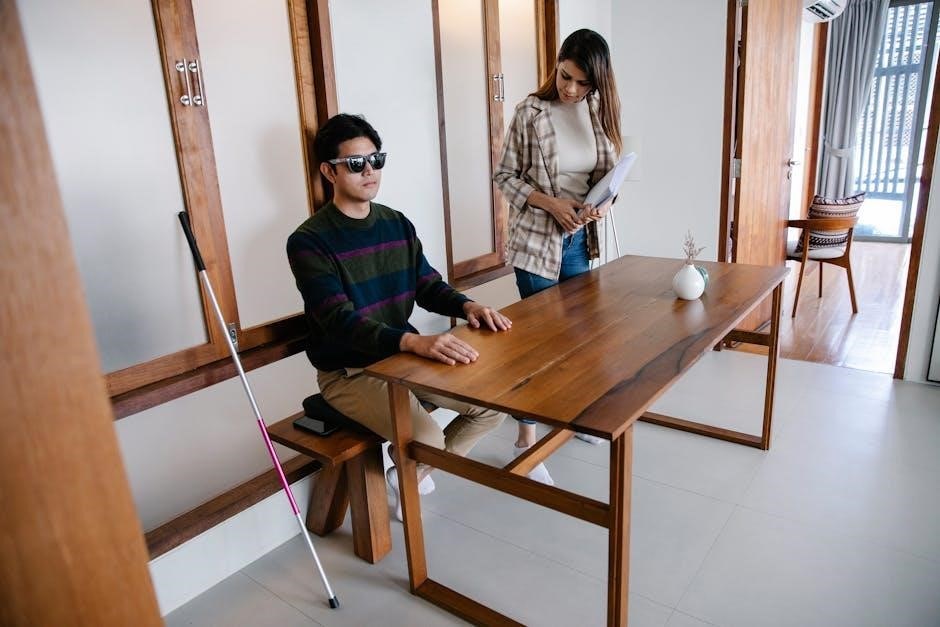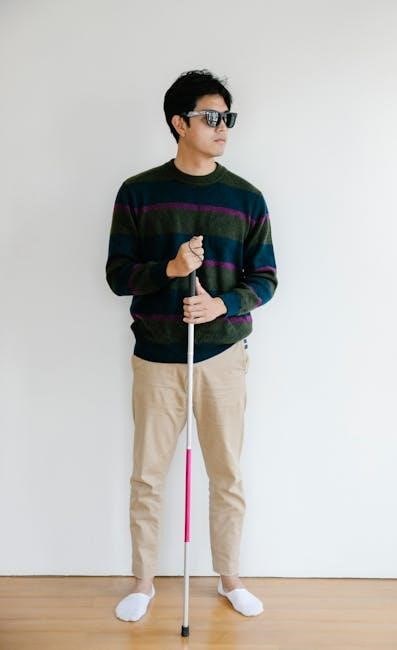This guide provides a comprehensive approach to fitting Dailies Total One Multifocal lenses‚ offering expert tips and best practices for eye care professionals․ It covers key aspects of multifocal contact lenses‚ including Alcon’s advanced technology‚ ensuring comfort and optical clarity for presbyopia correction․ The guide helps achieve successful fitting outcomes with detailed steps and troubleshooting advice․
Overview of Dailies Total One Multifocal Contact Lenses
Dailies Total One Multifocal contact lenses are specifically designed for presbyopic patients‚ offering crisp and clear vision at all distances․ These daily disposable lenses feature Alcon’s advanced water gradient technology‚ which ensures exceptional comfort and optical clarity․ The multifocal design provides a smooth transition between near‚ intermediate‚ and far vision‚ addressing the unique challenges of presbyopia․ With their aspheric optics and optimized zone design‚ these lenses minimize visual disturbances and deliver sharp focus․ The 3:2:1 zone ratio balances near‚ intermediate‚ and far vision correction‚ ensuring seamless visual transitions․ Made from Delefilcon A material‚ these lenses combine high breathability with moisture retention‚ reducing the risk of dryness; The daily disposable format also reduces the risk of deposits and infections‚ making them a hygienic choice․ These lenses are ideal for patients seeking convenience‚ comfort‚ and high-quality vision correction in a single solution;
Importance of Proper Fitting for Multifocal Lenses
Proper fitting of Dailies Total One Multifocal lenses is crucial for ensuring optimal vision and comfort for presbyopic patients․ Incorrect fitting can lead to visual disturbances‚ such as halos or glare‚ and may cause discomfort or dryness․ A well-fitted lens ensures proper centration and movement‚ which are essential for maintaining sharp vision at all distances․ Additionally‚ accurate fitting helps in minimizing adaptation time for patients transitioning to multifocal lenses․ The 3:2:1 zone ratio in these lenses requires precise alignment with the pupil to ensure seamless transitions between near‚ intermediate‚ and far vision․ Proper fitting also reduces the risk of eye strain and enhances patient satisfaction․ Eye care professionals must consider factors such as corneal curvature‚ pupil distance‚ and lifestyle needs to achieve a successful fit․ Regular follow-ups are recommended to validate the fit and address any concerns‚ ensuring long-term comfort and visual clarity for the patient․
Understanding Dailies Total One Multifocal Lens Parameters
Dailies Total One Multifocal lenses feature a 14․1mm diameter and 8․5mm base curve‚ made from Delefilcon A material․ The 3:2:1 zone ratio and water gradient technology ensure optimal comfort and vision correction for presbyopia․
Material and Technology Overview
Dailies Total One Multifocal lenses are crafted from Delefilcon A‚ a cutting-edge silicone hydrogel material known for its exceptional breathability and moisture retention․ The lenses feature a unique water gradient technology‚ where the core is highly hydrophobic‚ transitioning to a hydrophilic surface․ This design ensures long-lasting comfort and reduces the risk of dryness‚ making them ideal for all-day wear․ The aspheric optics and Precision Profile Design minimize spherical aberration‚ delivering sharp vision across all distances․ The 3:2:1 zone ratio optimizes near‚ intermediate‚ and far vision correction‚ providing seamless transitions for presbyopic patients․ The thin lens profile and precise curvature enhance centration and stability‚ while the light handling tint simplifies insertion and removal․ This advanced material and design combination ensures optimal comfort and visual clarity‚ addressing the unique needs of presbyopia effectively․
Key Lens Dimensions and Specifications
Dailies Total One Multifocal lenses are designed with precise dimensions to ensure optimal fit and comfort․ The lens diameter is 14․1 mm‚ and the base curve is 8․5 mm‚ providing a comfortable fit for most eyes․ The lenses are made from Delefilcon A‚ a silicone hydrogel material with a water content of 80%‚ ensuring high breathability and moisture retention․ The water gradient technology features a hydrophobic core that transitions to a hydrophilic surface‚ enhancing comfort and reducing dryness․ The lenses are available in a wide range of powers‚ including spherical‚ cylinder‚ and add powers‚ to address various presbyopic needs․ The 3:2:1 zone ratio optimizes near‚ intermediate‚ and far vision correction‚ while the aspheric optics minimize spherical aberration for sharp vision․ The lenses also feature a light handling tint for easier insertion and removal․ These dimensions and specifications ensure a precise fit‚ optimal comfort‚ and clear vision for patients with presbyopia․

The Fitting Process for Dailies Total One Multifocal
The fitting process involves a structured approach‚ starting with patient consultation and assessment of visual needs․ Lens selection‚ trial fitting‚ and evaluation follow‚ ensuring optimal centration and comfort․ Verification and validation steps confirm proper fit and vision correction‚ leading to successful outcomes for presbyopic patients․
Initial Patient Consultation and Assessment
The initial consultation is a critical step in the fitting process for Dailies Total One Multifocal lenses․ It begins with a detailed discussion of the patient’s symptoms‚ lifestyle‚ and visual needs to understand their expectations and requirements․ A comprehensive eye examination is conducted to assess refractive error‚ ocular health‚ and tear quality․ Key measurements include pupil distance‚ corneal curvature‚ and lens power determination․ These assessments help identify the correct multifocal parameters and ensure the lenses address presbyopia effectively․ Setting realistic expectations is crucial‚ as adaptation to multifocal vision may take time․ The practitioner also evaluates the patient’s ability to adapt to the multifocal design and addresses any concerns․ This foundational step ensures that the fitting process is tailored to the patient’s specific needs‚ laying the groundwork for a successful outcome with Dailies Total One Multifocal lenses․
Lens Selection and Prescription Calculation
Lens selection and prescription calculation are pivotal steps in fitting Dailies Total One Multifocal lenses․ The process begins with a precise evaluation of the patient’s refractive needs‚ including sphere‚ cylinder‚ axis‚ and add power․ Alcon’s multifocal fitting guide recommends starting with the patient’s current prescription as a baseline‚ then refining it based on trial lens feedback․ The 3:2:1 zone ratio is a key feature‚ balancing near‚ intermediate‚ and far vision correction․ Proper alignment of the near and intermediate zones with the pupil is critical for sharp vision at all distances․ The lens’s parameters‚ such as diameter and base curve‚ are selected to ensure optimal centration and comfort․ Accurate calculation of the add power and axis ensures minimal visual disturbances‚ while the aspheric multifocal design minimizes spherical aberration․ This step requires careful attention to detail to ensure the prescription aligns with the patient’s specific needs‚ providing clear and comfortable vision for daily activities․
Trial Lens Fitting and Evaluation
Trial lens fitting and evaluation are critical steps in ensuring the optimal performance of Dailies Total One Multifocal lenses․ During this phase‚ practitioners assess the lenses in real-world conditions to evaluate near‚ intermediate‚ and far vision clarity․ The fit is observed for proper centration‚ movement‚ and overall comfort․ Patient feedback is essential‚ focusing on vision quality‚ ease of adaptation‚ and comfort levels․ Any visual disturbances‚ such as halos or glare‚ are noted and addressed․ Adjustments to the prescription or lens parameters may be made based on these insights to refine the fit․ This step ensures the lenses meet the patient’s specific needs‚ providing clear and comfortable vision for daily activities․ Effective communication between the practitioner and patient is key to achieving the best possible outcome during this phase‚ ensuring the lenses deliver on their promise of crisp‚ seamless vision at all distances․

Verification and Validation of Fit
Verification and validation ensure Dailies Total One Multifocal lenses meet prescribed requirements․ Assessing lens performance‚ comfort‚ and vision correction accuracy confirms optimal fit․ Proper centration‚ movement‚ and patient-reported clarity validate the lenses’ effectiveness‚ ensuring crisp vision and comfort for presbyopia correction․
Assessing Lens Performance and Comfort
Assessing lens performance and comfort is crucial for ensuring Dailies Total One Multifocal lenses meet patient needs․ Visual acuity at all distances‚ lens centration‚ and movement are evaluated to confirm proper fit․ Comfort is gauged through patient feedback on adaptability‚ dryness‚ and irritation․ Key criteria include crisp vision‚ minimal halos‚ and smooth transitions between focal points․ The lenses should maintain moisture‚ ensuring prolonged wear comfort․ Patient-reported clarity and ease of use are vital validation steps․ Proper fit ensures optical clarity and comfort‚ confirming the lenses meet the patient’s needs effectively․
Adjusting Prescription for Optimal Vision
Adjusting the prescription for Dailies Total One Multifocal lenses is essential to ensure sharp vision at all distances․ The eye care professional may refine the sphere‚ cylinder‚ axis‚ and add power based on patient feedback․ Balancing the prescription between both eyes is critical for binocular vision․ Trial lenses are used to fine-tune the fit‚ ensuring minimal visual disturbances․ Patients may need time to adapt to the multifocal design‚ so gradual adjustments are often necessary․ Proper alignment of the lens with the pupil and precise centration are key for optimal performance․ If vision clarity issues arise‚ modifying the near or intermediate correction can address these concerns․ The goal is to achieve a balance between near‚ intermediate‚ and far vision‚ mimicking the natural focusing ability of a younger eye․ By making precise adjustments‚ the lenses can deliver crisp‚ comfortable vision for everyday tasks like reading‚ computer use‚ and distance viewing‚ ensuring patient satisfaction and functional outcomes․

Troubleshooting Common Fitting Issues
Common fitting issues with Dailies Total One Multifocal lenses include discomfort and vision clarity problems․ These can often be resolved by reassessing the fit and ensuring proper lens hygiene․ If dryness occurs‚ recommending lubricating drops may alleviate symptoms․ Vision clarity issues might require adjusting the power or cylinder to better match the patient’s needs․ Proper follow-up care and patient education on handling lenses can significantly improve comfort and optical performance‚ ensuring a satisfactory experience for presbyopic wearers․
Addressing Discomfort and Vision Clarity Problems
Discomfort and vision clarity issues with Dailies Total One Multifocal lenses can often be resolved by reassessing the fit and ensuring proper lens hygiene․ Dryness is a common cause of discomfort‚ and recommending lubricating drops may alleviate symptoms․ Vision clarity problems might require adjusting the power or cylinder to better match the patient’s needs․ Proper follow-up care and patient education on handling lenses can significantly improve comfort and optical performance․
Troubleshooting may involve checking the lens centration and movement․ If issues persist‚ alternative multifocal designs or refractive corrections may be explored․ Regular follow-ups and open communication with patients are key to achieving a successful fit and maintaining satisfaction over time․
Alcon’s 3:2:1 zone ratio and water gradient technology help minimize discomfort and vision disturbances‚ but proper fit and hygiene practices are essential for optimal results․ Patients should be educated on proper lens care to prevent complications and ensure long-term comfort and clarity․

Reassessing Fit and Lens Hygiene

Reassessing the fit and ensuring proper lens hygiene are critical steps in resolving discomfort and vision clarity issues with Dailies Total One Multifocal lenses․ If discomfort persists‚ practitioners should evaluate lens centration‚ movement‚ and overall fit using diagnostic tools like slit-lamp evaluation․ Adjusting lens parameters‚ such as base curve or diameter‚ may improve comfort and optical performance․ Proper hygiene practices‚ including hand washing before handling lenses and avoiding tap water or saliva‚ are essential to prevent contamination and maintain lens integrity․

Patient education plays a key role in addressing hygiene-related issues․ Emphasizing the importance of proper lens care‚ such as using recommended cleaning solutions and replacing lens cases regularly‚ can significantly enhance comfort and reduce complications․ Regular follow-ups allow practitioners to monitor lens performance and make necessary adjustments‚ ensuring long-term satisfaction and optimal vision correction for presbyopic patients․
Follow-Up Care and Patient Education

Regular follow-ups and patient education are essential for maintaining optimal comfort and vision with Dailies Total One Multifocal lenses․ Scheduling routine appointments ensures proper lens performance and addresses any emerging concerns promptly․ Educating patients on proper hygiene practices‚ such as hand washing and avoiding improper lens care‚ enhances comfort and reduces complications․ Emphasizing the importance of adhering to replacement schedules and using recommended cleaning solutions further supports long-term satisfaction and eye health․

Importance of Regular Follow-Up Appointments
Regular follow-up appointments are crucial for ensuring the long-term success of Dailies Total One Multifocal lens wear․ These visits allow eye care professionals to monitor lens performance‚ address any emerging concerns‚ and make necessary adjustments to the prescription or fit․ During follow-ups‚ visual acuity is re-evaluated to confirm that the lenses are providing clear vision at all distances․ The practitioner also assesses the lenses’ centration‚ movement‚ and overall comfort‚ ensuring they continue to meet the patient’s needs․ Additionally‚ follow-ups provide an opportunity to reinforce proper lens care and hygiene practices‚ reducing the risk of complications․ Patients with presbyopia may require more frequent check-ups to accommodate any changes in their vision or eye health․ By maintaining regular follow-up care‚ practitioners can help patients achieve optimal comfort‚ optical clarity‚ and satisfaction with their Dailies Total One Multifocal lenses‚ ensuring a successful and healthy wearing experience․
Proper Lens Care and Hygiene Practices
Proper lens care and hygiene are essential for maintaining the health of your eyes and ensuring the longevity of your Dailies Total One Multifocal lenses․ Always wash your hands thoroughly with soap and water before handling your lenses to prevent the transfer of dirt or bacteria․ Use a lens care solution recommended by your eye care professional to clean‚ disinfect‚ and store your lenses․ Avoid using tap water or saliva‚ as these can introduce harmful microorganisms․ Replace your lens case every 3 months to prevent bacterial growth․ For daily disposable lenses like Dailies Total One Multifocal‚ always discard the lenses after one day of use and open a new pair for the next day․ Proper hygiene practices‚ such as not sharing lens care products and ensuring the lens case is clean‚ are critical for maintaining eye health․ By following these guidelines‚ you can enjoy clear‚ comfortable vision while minimizing the risk of complications․
In conclusion‚ mastering the fitting process for Dailies Total One Multifocal lenses ensures optimal comfort and vision for presbyopic patients․ By following the guide’s expert advice and best practices‚ eye care professionals can enhance patient satisfaction and lens performance effectively․
Best Practices for Successful Fitting
Successful fitting of Dailies Total One Multifocal lenses begins with a thorough patient consultation to understand visual needs and lifestyle․ Accurate measurements‚ including pupil distance and corneal curvature‚ are essential for proper lens selection․ Using trial lenses to assess real-world performance ensures optimal fit and comfort․ Adjustments based on patient feedback are critical to refine prescription accuracy and address any visual disturbances․ Regular follow-ups are vital to monitor lens performance and make necessary modifications․ Proper patient education on lens care and hygiene practices‚ such as hand washing and avoiding tap water‚ is key to maintaining eye health․ Emphasizing realistic expectations and the potential need for adaptation time helps improve patient satisfaction․ By combining precise fitting techniques with personalized care‚ eye care professionals can maximize the benefits of Dailies Total One Multifocal lenses‚ ensuring crisp vision and all-day comfort for presbyopic patients․

Enhancing Patient Satisfaction and Lens Performance
Enhancing patient satisfaction and lens performance with Dailies Total One Multifocal lenses involves a combination of proper fitting‚ patient education‚ and follow-up care․ Ensuring precise centration and alignment of the multifocal zones with the pupil is critical for sharp vision at all distances․ Patient feedback during the trial phase is invaluable for refining the prescription and addressing any visual disturbances․ Educating patients on realistic expectations‚ adaptation time‚ and proper lens hygiene practices fosters confidence and compliance․ Regular follow-ups allow practitioners to monitor lens performance‚ make necessary adjustments‚ and address any emerging issues promptly․ By prioritizing patient comfort and visual clarity‚ eye care professionals can maximize the benefits of Dailies Total One Multifocal lenses‚ ensuring a seamless transition between near‚ intermediate‚ and far vision․ Open communication and personalized care are key to achieving high patient satisfaction and optimal lens performance․



